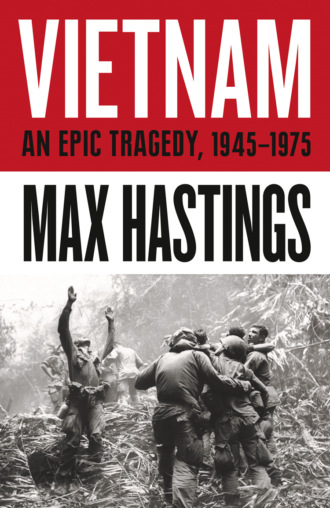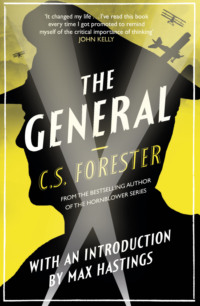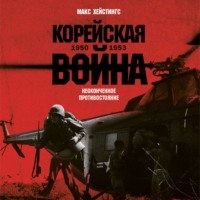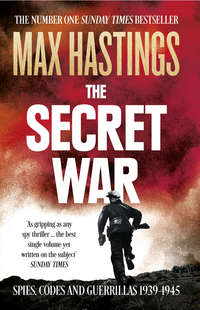
Полная версия
Vietnam: An Epic History of a Divisive War 1945-1975
More puzzling than France’s rashness and inhumanity was US willingness to support them. Without military aid, Paris’s colonial policy would have collapsed overnight. Fredrik Logevall observes that there would have been no contradiction about an American decision to assist France’s domestic revival, while withholding backing for its imperial follies. Washington’s contrary call was made partly because, even before the Cold War became icy, policy-makers recoiled from acquiescence in communist acquisition of new territorial booty. While American liberal intellectuals detested colonialism, in an era when much of their own country was still racially segregated, the spectacle of white men lording it over ‘lesser races’ did not seem as odious as it would soon become. In the late 1940s, French policy was less closely linked to US anti-communism than it later became, but the interests of the Vietnamese people – or for that matter of their Malagasy, Algerian and suchlike brethren – ranked low in the priorities of President Harry Truman.
Some Vietnamese at first regarded the return of the French as an acceptable temporary expedient, to rid themselves of the Chinese plundering the north. Ho Chi Minh received token recognition as master of Tonkin, while Bao Dai’s nominal rule over the country was acknowledged. In July 1946, when Ho visited Paris for talks about the constitutional future, he was greeted with the honours of a head of state. This, however, was mere window-dressing. In the talks at Fontainebleau that followed, the Paris government made it plain that he had been summoned only to receive the instructions of his masters, not to negotiate a reassignment of power. De Gaulle said: ‘United with the overseas territories which France opened to civilisation, she is a great nation. Without these territories she would be in danger of no longer being one.’
The head of the French delegation told a Vietminh representative contemptuously: ‘We only need an ordinary police operation for eight days to get all of you out.’ For some weeks, Ho lingered in frustration. Truong Nhu Tang, almost three decades later a Southern revolutionary minister, was among a group of Vietnamese students who met their hero in Paris. They were entranced when the aspiring national leader instructed them to call him ‘Uncle Ho’ rather than ‘Mr President’. He asked their opinions about Vietnam’s future, devoted an afternoon to conversation with them: ‘It is hard to think of another world leader who under similar circumstances might have done the same.’ When Ho found that the north, centre and south of the country were all represented in the student group, he said, ‘Voilà! The youth of our great family … You must remember, though the rivers run dry and the mountains crumble, the nation will always be one.’ His remarks profoundly impressed his young compatriots, because they evoked ‘the language of slogan and poetry that Vietnamese leaders had always used to rally the people … From that afternoon I was Ho Chi Minh’s fervent partisan. I had been won by his simplicity, charm, familiarity. His … burning patriotism offered me a role-model for my own life.’
Ho returned to Tonkin knowing that no peaceful settlement was attainable. The French behaved with unswerving duplicity: as fast as more troops, planes and warships became available, they tightened their grip in the south, then reached out for the north. That summer of 1946 their foremost soldier, Philippe Leclerc, directed military operations: he branded Ho an enemy of France, and unwisely declared the conflict as good as won. The general treated with contempt Giap, Ho’s former intelligence chief who was then presumptive Vietminh ‘minister of defence’. Giap’s broad, infectious grin deluded some Westerners into believing that he was a more genial and pliable figure than his leader. In truth, Giap’s vanity matched his ruthlessness: the Frenchman’s casual insults fuelled his loathing for the colonialists.
Leclerc belatedly changed his mind about Indochina, becoming convinced that it could not be held in the face of a nationalist hostility shared by communists and non-communists alike. Yet shortly afterwards he was killed in an air crash in Africa, and Thierry d’Argenlieu thereafter dominated his country’s policy-making. The high commissioner was a figure of Jesuitical inflexibility, who persuaded the Paris government that the Vietminh could be crushed: ‘It is from now on impossible for us to deal with Ho Chi Minh … We shall find other people with whom we can negotiate.’ The French dallied with promoting the young ex-emperor Bao Dai. Yet in Vietnam, as in many oppressed nations around the world, a tide was running strongly for the Left. No other Vietnamese remotely matched the grip upon popular imagination secured by Ho.
In November 1946, following the breakdown of negotiations, the French launched a brutal naval and air bombardment of the Vietminh’s alleged strongholds in and around the port of Haiphong. Several thousand people perished, and only the city’s European quarter escaped devastation. On 19 December d’Argenlieu issued an ultimatum calling on the Vietminh to quit, to which they responded by staging an armed insurrection in Hanoi, sustained for sixty days. When at last they were expelled amid widespread destruction, the French deluded themselves that they had regained control of Tonkin.
Foreign observers were sceptical, however. A correspondent of The Times of London wrote in December: ‘Any colonial power which puts itself in the position of meeting terrorism with terrorism might as well wash its hands of the whole business. We are about to see the French army reconquer the greater part of Indochina only to make it impossible for any French merchant or planter to live there outside a barbed-wire perimeter.’ Ho and Giap, preparing for a long campaign, needed bases beyond range of France’s airfields and heavy guns. Thus, their main army, some thirty thousand strong, abandoned towns and cities and marched away to Viet Bac, the remote north-western region.
The Vietminh leaders, who became cave- or hut-dwellers, never deluded themselves that they could achieve absolute military victory. Instead, they sought merely to make French rule prohibitively costly. To this end, covert local groups waged guerrilla war, while regular forces launched setpiece operations where conditions appeared favourable. They relied chiefly on captured weapons, but also began to manufacture their own, assisted by some three thousand Japanese deserters. With boundless ingenuity, they scavenged French cartridge cases for reloading, made mines from captured shells and mortar bombs. At the outset, they exercised overt or secret control of around ten million people, most of whom paid taxes to them, and performed labour or military service. Though the Vietminh denounced opium trafficking as a manifestation of colonial exploitation, Ho boosted the movement’s revenues by the same means.
Families are almost sacred hubs of Vietnamese society, yet in those days many became riven. Ten-year-old Tran Hoi’s father was a Hanoi small businessman who continued to acquiesce in French rule. He said: ‘If we have to choose between colonial domination and communism, I will take colonialism, because it means access to Western civilisation.’ There was a bitter row when Hoi’s uncle, a doctor, announced his own determination to join Ho Chi Minh. The clan’s divisions, like those of many others, remained unhealed through decades of strife that now began to unfold.
2
The ‘Dirty War’
1 STEAMROLLER TYPES
In the early months of 1947 Charles Trenet crooned irresistibly, reminding the world of the glory of the French language: ‘La mer, qu’on voit danser la long des golfes claires’, words rendered banal in English: ‘The sea, that we see dancing the length of the bright bays’. Christian Dior seized the imagination of fashionable womankind with his New Look, unfolding swathes of fabric beneath a tight waist and bodice, putting to flight years of austerity. French culture, style, beauty both natural and man-made, were once more ascendant. From Paris the writer Nancy Mitford tirelessly mocked her English compatriots for their inability to match her hosts’ cuisine, wit, sophistication.
And yet these same clever, conceited, morbidly insecure people chose to immerse themselves in a brutal colonial war eight thousand miles from home, which eventually cost their own side more than ninety thousand dead, and the Vietnamese people far more. Most of the inhabitants of metropolitan France regarded the struggle to preserve their overseas empire – la sale guerre, ‘the dirty war’ – with indifference, if not outright cynicism. De Gaulle, now in political exile, displayed belated doubts, which soon became certainty, that France had no vital interest in Indochina, and could not prevail there. Yet a vocal minority cared passionately, and promoted a fabulously expensive military commitment.
George Orwell observed that the quickest way to end a war is to lose it, whereas it was France’s misfortune to take almost a decade to achieve this. The struggle for Indochina took different forms, according to the regions of the country. In the north, large forces manoeuvred and fought against communist formations that eventually mustered sixty thousand men, supported by a revolving cast of peasant porters. A Vietminh document declared the dry season between October and April ‘most propitious for fighting’, while the rainiest months from May to October, when movement became difficult, were for rest, training, redeployment, planning. Meanwhile in towns and cities, the French strove to combat terror attacks – bombs thrown into crowded cafés, shootings of officials. Such incidents became part of a new normality: at a mayoral reception in Haiphong, guests were momentarily alarmed by a nearby explosion and gunshots, but cocktails and conversation resumed when it was learned that a Vietminh had merely been shot dead after tossing a grenade at a police station. In one unusually successful and cruel attack, guerrillas burst in upon a dinner party held at a French home at Cap St Jacques, near the mouth of the Saigon River. They killed with grenades and old British sten guns eight officers, two women, six children and four Vietnamese servants.
Across the countryside, a network of almost a thousand forts and miradors – watchtowers skirted with mines, concertina wire, logs, sandbags, corrugated iron and trenches prickling with sharpened bamboo stakes – was created to protect villages and roads. These had indifferent success in containing the Vietminh, who lifted the mines for their own use, and could usually overrun a local post if they set their minds to it. French small craft fought fierce battles on the Black River against guerrillas firing from the shore.
Meanwhile, high in the mountains and deep in the jungle, French special forces of the GCMA – Groupement de Commandos Mixtes Aéroportés – led tribesmen who hated the communists for their own reasons. Since insertion and extraction were dependent upon airstrips, some GCMA men went native because they had no choice; more than a few never returned to civilisation. This became the last conflict in which paratroops made repeated operational jumps, some as often as once a week. For most French units, however, this was a road-dominated war, in which helicopters played only a marginal role: even in the struggle’s last days, the colonial power owned just twenty-three. Infantry conducted an interminable succession of sweeps across the countryside, with such lyrical code names as Citron, Mandarine, Mercure, Artois, Mouette and Nice I & II. These killed some Vietminh, but only in return for a terrific expenditure of effort and intensification of peasant grievances.
Giap had attended no war college, yet read voraciously: he became obsessed with Napoleon, Clausewitz and the guerrilla tactics of Mao. His forces achieved one of their first high-profile successes on 27 January 1947, ambushing a convoy carrying Vietnamese politicians in French service on an inspection tour of the north. Fourteen vehicles were destroyed, the education minister and a French engineer killed. The attack impressed the authorities by its boldness and efficiency, and more of the same followed. Route 5 from Hanoi to Haiphong became known as ‘the road of blood’. A village on the north–south Route 1 was so notorious an ambush site that the French bulldozed it.
The two sides competed in ruthlessness. The Vietminh executed village chiefs who declined to bow to their will, often by live burial before peasant audiences, after subjecting them to tortures of medieval ingenuity. When the Vietminh killed one Vietnamese soldier captured in French service, a guerrilla borrowed a pair of pliers from a nearby house, with which he removed the man’s gold fillings. A child witness wrote: ‘I had seen many corpses beheaded, dismembered, eviscerated, even scalped, yet nothing more disgusting than the sight of that guerrilla holding the two gold teeth, his face beaming.’ Vietnamese adapted readily to conducting covert lives in parallel with their overt ones, because their society had a long tradition of secret associations.
The French employed every extravagance of firepower on the battlefield, and allowed their troops almost absolute licence behind it. The writer Norman Lewis described his first flight to Saigon. His neighbour in the Air France plane was a Foreign Legion colonel, who peered at the Mekong delta below with the jaundiced eye of familiarity. As they passed a cluster of huts at two thousand feet, Lewis’s innocent gaze fixed upon what might have been a wisp of incense curling upwards. Then he grasped that it was, instead, a billowing pall of smoke. When moving specks also became visible, his neighbour the Legionnaire observed sagely, ‘Une opération.’ Lewis wrote: ‘Somehow, as he spoke, he seemed linked psychically to what was going on below. Authority flowed back into the travel-weary figure. With the accession of this priestly essence he dominated the rest of the passengers. Beneath our eyes violence was being done, but we were as detached from it almost as from history … One could understand what an aid to untroubled killing the bombing plane must be.’
French brutality was driven partly by the habit of racial domination, partly by consciousness that even if many peasants were not active foes, they knew where the enemy was, in which culvert or on what path his snares awaited the unwary. The colonialists and their allies of the Cao Dai and Hoa Hao – southern religious sects with formidable private armies – are reckoned to have killed five civilians for every one of their own people who perished. The November 1948 massacre of over two hundred Vietnamese women and children at My Trach, in the southernmost province of what would become North Vietnam, is scarcely acknowledged in modern France, yet seems evidentially beyond doubt. Meanwhile, following incidents such as an ambush in which the founders of the Hoa Hao were killed, ‘The Hoa-Hao liked to tie Viet-Minh sympathisers together with rope and throw them into the rivers to drown in bundles,’ in the words of Bernard Fall, ‘floating down the river like so many trains of junks, at the mercy of the currents and tides.’
An American, Bob Miller of United Press, was aboard a French armoured barge patrolling a canal late one night when its searchlight fixed upon three sampans, breaching the curfew. Two that ignored an order to halt were riddled with machine-gun-fire. The third contained two elderly peasants and their son, with a cargo of rice. The sacks were duly tipped overboard, whereupon the boy sought to escape by leaping into the water. A soldier tossed a grenade in his wake, killing him. A courteous young French officer explained to Miller that ‘it was only by making people understand that breaches of the regulations would be punished with extreme severity that [the French] could hope to keep the upper hand’. Upper hand? Even in the relatively quiet years 1947–48, a single Foreign Legion battalion suffered two hundred casualties from mines, skirmishes and ambushes.
The Legion has become part of a heroic legend of Indochina. Yet other French soldiers derided them as genre rouleau compresseur – ‘steamroller types’. Among Vietnamese civilians their units – which included some former members of Hitler’s SS and Wehrmacht – achieved an appalling reputation for rape and pillage. Duong Van Mai, one of a traditional mandarin family, described how Legionnaires entered her home, slit suitcases with their bayonets and removed whatever property took their fancy. As her family trekked through the northern war zone, French soldiers stripped them of cash and gold, deemed legitimate warriors’ perquisites. Black colonial troops were less discriminating, seizing even villagers’ poor stocks of salt and nuoc mam – fish sauce. As in Europe in World War II, Moroccans were the most unwelcome visitors that a district could suffer. Meanwhile the Vietminh might be notoriously cruel, but were also famously honest.
The Austrian-born French writer and adventurer Bernard Fall’s books on his nation’s Indochina war are often cited as classics: they offer vivid anecdotage, some of it believable, and shrewd analysis of the difficulties of conducting counter-insurgency. Yet they embrace an essentially heroic vision of the French army, while remaining mute about the many atrocities its soldiers committed, of which Fall, as a contemporary witness, must have been aware. Vietnamese in French service showed little more sensitivity: American Howard Simpson watched exuberant parachutists tearing down a Saigon street in a jeep which crushed and scattered a row of bamboo panniers, filled with red peppers laid out to dry in the sun. After the vehicle passed, two old women set to work painstakingly to collect the debris and salvage what they could of their ravaged wares. Here was a minuscule event amid a vast tragedy, yet Simpson asked himself, how could it fail to influence the hearts and minds of its victims, those two elderly street-sellers?
Early in 1948 a half-hearted attempt was made to establish an anti-communist political front under the patronage of Bao Dai, who returned from exile shortly afterwards at the age of thirty-four. Yet the emperor, indolent and spoilt, was soon preoccupied with currency racketeering in partnership with French politicians. Bereft of both moral and political authority, his interests were girls, hunting and yachts. Thus France resolved to settle its difficulties by military means, and eventually deployed in Indochina sixty-two infantry battalions including thirteen North African, three paratroop, and six Foreign Legion. In addition several hundred thousand militiamen, of doubtful utility, guarded villages and roads.
Until the last stage of the war, the French never lacked for local volunteers, who needed the money. Some Vietnamese soldiers distinguished themselves in France’s service – brave, proficient, loyal to their salt. Many more, however, proved reluctant to fight with anything like the necessary determination. Moreover, French commanders never resolved a chronic dilemma: how to concentrate superior strength against Giap’s regular formations in the north, while protecting a thousand prospective targets elsewhere. Neither the French and their allies nor the communists had strength enough to dominate the whole country. In Christopher Goscha’s words: ‘Instead they all administered competing, archipelago-like states, whose sovereignties and control over people and territories could expand and shrink as armies moved in and out and the balance of power shifted.’ It seems to some historians strange that the French, who had so recently suffered a cruel occupation of their own homeland, should decline to recognise that atrocities alienate. Yet some Frenchmen derived a different message from their experience: that Nazi harshness had worked, until mid-1944 cowing an overwhelming majority of their countrymen.
In October 1949 the struggle intensified dramatically. China, Vietnam’s giant northern neighbour, acquired a communist government led by Mao Zedong, which set aside his nation’s historic animosity to back the Vietminh. Suddenly, Ho and Giap gained access to safe havens and American weapons captured from Chiang Kai-shek’s defeated Nationalists. Vietminh training schools were established behind Mao’s frontier. Hundreds of Chinese military advisers attached themselves to Giap’s troops. In the north-west of Vietnam, the French began to suffer calamitious attrition. They were striving to hold the country with forces largely confined to the roads, against an enemy of the jungle and mountains. One ambush on Route 4, which twisted through mountain defiles just below the Chinese border, cost a column of a hundred vehicles half that number, and most of the occupants were butchered. The French were obliged to relinquish swathes of territory.
One of the most extraordinary human stories of that period concerns Le Duan, who would later succeed Ho Chi Minh. Born in 1907 in central Vietnam, he was a committed communist revolutionary a decade before Ho returned from exile, serving two long terms of imprisonment. He now acted as secretary of COSVN, the Vietminh’s southern directorate. Where other leaders had their own huts, bodyguards and cooks, the grimly austere Le Duan chose to sleep in a sampan moored deep in the Mekong delta, from which he worked with two aides. Among their couriers was a pretty, French-educated girl named Nguyen Thuy Nga. She was in love with another revolutionary, but the province Party committee had terminated the relationship, because the man had a wife and family elsewhere.
One day in 1950 Le Duan asked Nga to join him for breakfast. She was somewhat in awe of the ferocious energy and commitment that had earned him the nickname ‘two hundred-candlepower’. Tall, lean, gaunt, his clothes were in rags. Chain-smoking incessantly, he seemed to have no thought for anything save the revolution, and was twice Nga’s age. Before long, however, he announced that he had chosen her as his bride. She remonstrated that he, like her previous lover, already had a wife and children in the north. Le Duan shrugged that he had been victim of an arranged marriage, and had known nothing of his ‘wife’ for twenty years. Their wedding was held at COSVN jungle headquarters with Le Duan’s close comrade Le Duc Tho acting as matchmaker. The couple’s new life was scarcely domesticated: there was no trousseau, for the bride owned only a single pair of trousers. When they shifted camp, taking what little they owned in sampans, often Nga had to leap into the water alongside the men and push the boat over shallow places. They were always hungry, and seldom found more than a few jungle roots and vegetables with which to flavour the meagre rice ration.
Through 1951–52 Nga worked devotedly as Le Duan’s political secretary, and gave birth to a daughter named Vu Anh. Her husband seemed to love her, and once astonished her by a gesture of shameless frivolity when she approached COSVN through a patch of elephant grass. Glimpsing her he ran forward, seized her by both hands and swung her joyfully around himself. Here was an almost unique glimpse of human frailty in the life of this icily focused man who would play a role in Vietnam’s wars second only to that of Ho.
From 1951 onwards, the Vietminh emphasised ever more strongly the centrality of ideology, which in earlier years Ho downplayed. The Chinese supplied not merely military tutelage, but also political advice about how to establish a communist society, for which a key imperative was suppression of dissent: in the first two years of Mao Zedong’s rule, he killed an estimated two million of his own people. Now, in many Vietminh-controlled areas, radios were banned, to deny peasants access to information save that dispensed by the Party. Most intellectuals and middle-class adherents of the movement became outcasts.
Because the most fiercely contested battlefields lay in the north, that region’s people suffered dreadfully at the hands of both sides. Nguyen Cong Luan grew up in a small village near Hanoi, which reluctantly accepted French suzerainty. In consequence his father was seized by the Vietminh, subjected to torture, and eventually met death in one of their punishment camps. Yet colonial troops frequently detained his son, and on several occasions the boy feared for his life. France’s definition of its own role in Indochina as a mission civilisatrice was mocked by the reality. Luan wrote: ‘Our submission to the French military authority did not protect us from being looted, raped, tortured, or killed. Every private, whether he was a Frenchman, an African, or a Vietnamese could do almost anything he wanted to a Vietnamese civilian without fear of being tried in a court or punished by his superiors … A sergeant … had the power of a viceroy in the Middle Ages … People addressed him as “Ngai”, a word equivalent to “Your Excellency”, only used in connection with gods and mandarins.’








